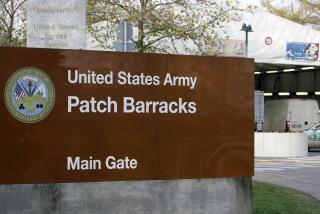U.S. Confirms Hijack Alert, May Revise Warning Policy
- Share via
WASHINGTON — The Bush Administration, after a fierce internal debate, acknowledged Thursday that the Federal Aviation Administration had warned airlines secretly last week that three Lebanese-Palestinians it named might attempt to hijack an American aircraft in Western Europe.
The reluctant admission, coming after unauthorized disclosure of the alert by a London newspaper, prompted renewed public concern about the safety of air travel and stepped up pressure on the Bush Administration to re-evaluate the current system of circulating such alerts on a confidential basis.
U.S. officials have sought to adhere to a strict policy of withholding such information from the public. And at first they steadfastly denied that any such warning had been issued.
After an interagency debate that raged late into Wednesday night, however, the White House finally confirmed Thursday that the FAA had distributed the warning, which it said was based on credible information about the possible attack.
The tip-off came from Jordanian intelligence sources, The Times has learned.
Arguing that the sensitive information is not designed for public consumption, the White House refused to discuss specifics contained in the bulletin, one of about 30 security warnings that the FAA issues each year to domestic airlines and foreign governments.
Meanwhile, an infuriated Transportation Secretary Samuel K. Skinner vowed to track down the source of the leak.
But there were increasing signs Thursday that the latest scare, coming three months after the bomb that brought down Pan Am Flight 103 over Scotland last December and new reports of security lapses, could push the Administration toward a policy change requiring that the government make public information about the likelihood of terrorist attacks.
Such a change is viewed by many experts in and out of government as something that is now politically unavoidable, even though it may make the fight against terrorism more difficult.
“The system has been undermined completely,” a senior counterterrorism official said. “The FAA now has to say that there is an alert out there.”
Other Administration officials involved in counterterrorism echoed the argument, saying that the government now will have to make the most credible threats public.
Dramatic Reminder
“The environment has changed,” one official said, noting that travelers who once gave little thought to security warnings now have been reminded dramatically that the government withholds information from them and are insisting that they have a right to know.
Reflecting that new reality, John Root, the husband of a Pan Am victim, complained in a television interview: “They’re treating us like children, and we should have the right to decide for ourselves.”
The current policy keeps the warnings secret on grounds that making them public would compromise intelligence sources and actually increase the risk for travelers by letting terrorists know where extra security precautions would be taken.
“It’s like saying you expect a robbery at the First National Bank,” said John Leyden, an FAA official. “They’re just going to hold up the Second National Bank.”
Backing Present Policy
The majority of experts said Thursday that they continue to regard the present policy as sensible in terms of counterterrorism tactics. To publicize every threat, private terrorism expert Neil Livingstone said, would allow terrorists to “pull our chain” merely by making a telephoned threat.
The international transportation system and airlines’ economic health could be disrupted easily and frequently.
As evidence that the current warning policy is working well, one U.S. counterterrorism source disclosed that the Administration last month received two separate and reliable tips that a Middle East group was going to blow up a plane in Zurich, Switzerland. Precautions were taken, the source said, and nothing happened.
But many said that the outbreak of concern, which developed when an exclusive report in the London Daily Express about the hijacking threat was relayed around the world Wednesday night by the media, might make a policy change politically necessary.
The newspaper reported that the FAA bulletin, dated March 16, had informed airlines that three Lebanese-Palestinians, carrying passports from Bahrain, Pakistan or Yemen, might try to hijack a plane in Western Europe. It listed three “possible names” that the men might use and urged airlines to “challenge and detain” anyone traveling under the names or anything similar.
In confirming that the security bulletin had been issued, White House Press Secretary Marlin Fitzwater declined to discuss the aliases or the precautions airlines had been advised to take.
Daily Express reporter Robert McGowan wrote that the bulletin warned airport check-in desks that all males ages 15 to 50 traveling on Bahraini, Pakistani or Yemeni passports “must be reported to the check-in supervisor” unless accompanied by family, including children.
Military Informed
McGowan also reported specifically that “American military personnel and diplomats and their families have been told of the threat, which centers on U.S. airlines. They were advised to alter routine plans to return home from Europe for Easter.”
Contradicting some reports, Fitzwater stressed that the FAA bulletin had not suggested that the attack might take place over the Easter holiday and said that it had not specified an airline or airport as a potential target.
He refused to comment further, saying, “I don’t want to unnecessarily scare people.”
Nevertheless, both the FAA and the airlines reported an unusually high volume of telephone calls from passengers demanding further information.
“We’ve just been flooded by calls from private citizens who ask, ‘Can I put my daughter on a plane to Paris?’ ” said Leyden, the FAA official.
“We have certainly had questions from passengers,” said Pamela Hanlon, a spokesman for Pan Am. “I’m sure you can appreciate why.”
Another airline executive, speaking on condition of anonymity, said that “crews are panicking (and) passengers are canceling” in the aftermath of the newly reported hijacking threat.
‘Heightened Concern’
At the Transportation Department, a spokesman for Skinner said that the secretary shared in the “heightened concern” over the security system in light of the disclosure of the bulletin and that the agency plans to step up the pace of a review that seeks to evaluate whether current security procedures are working effectively.
“I think you have to look at the whole process now in light of this,” said the spokesman, David Prosperi.
Skinner faced tough questioning Thursday before an aviation subcommittee of the House Committee on Public Works, with some members making clear in a closed session that they believe the public should be notified of some terrorist threats, according to participants.
The panel chairman, Rep. James L. Oberstar (D-Minn.), told reporters outside the hearing room that he thinks that the FAA could take such a step immediately, without congressional authorization.
Elsewhere on Capitol Hill, Sen. Alfonse M. D’Amato (R-N.Y.) stepped up his campaign for legislation that would require the FAA to make information about “credible threats” available to the public through a toll-free telephone line.
If such a measure were in effect, D’Amato said through a spokesman, “there would be an orderly and systematic process for notifying the public of credible and serious security threats.”
Meanwhile, officials at American Airlines met into the night Thursday considering whether to support the move for a change in policy.
More Discretion Sought
Officials at other airlines declined official comment. But some airline executives argued privately that they should have more discretion in deciding whether to notify their passengers of threats. “It’s a decision for each carrier to make based on individual circumstances,” one official said.
Another airline executive complained that the FAA often fails to evaluate terrorist threats adequately and that it never issues follow-up bulletins informing airlines when the threat is no longer valid.
Under the current system, the CIA and other agencies pass on to the FAA an average of one or two warnings a day, officials said. The information differs in credibility, with some based on anonymous telephone calls and other tips from friendly intelligence agencies.
Officials in the Office of Civil Aviation Security then decide which appear sufficiently serious to be passed on as warnings to domestic airlines and foreign governments. In the last 14 months, according to a recent investigation by a House subcommittee, 33 such security bulletins have been issued.
An intra-Administration review of the process undertaken in the wake of the Pan Am bombing determined that the current system should be preserved.
Times staff writers Ronald J. Ostrow and Brian J. Couturier contributed to this report.
More to Read
Sign up for Essential California
The most important California stories and recommendations in your inbox every morning.
You may occasionally receive promotional content from the Los Angeles Times.













